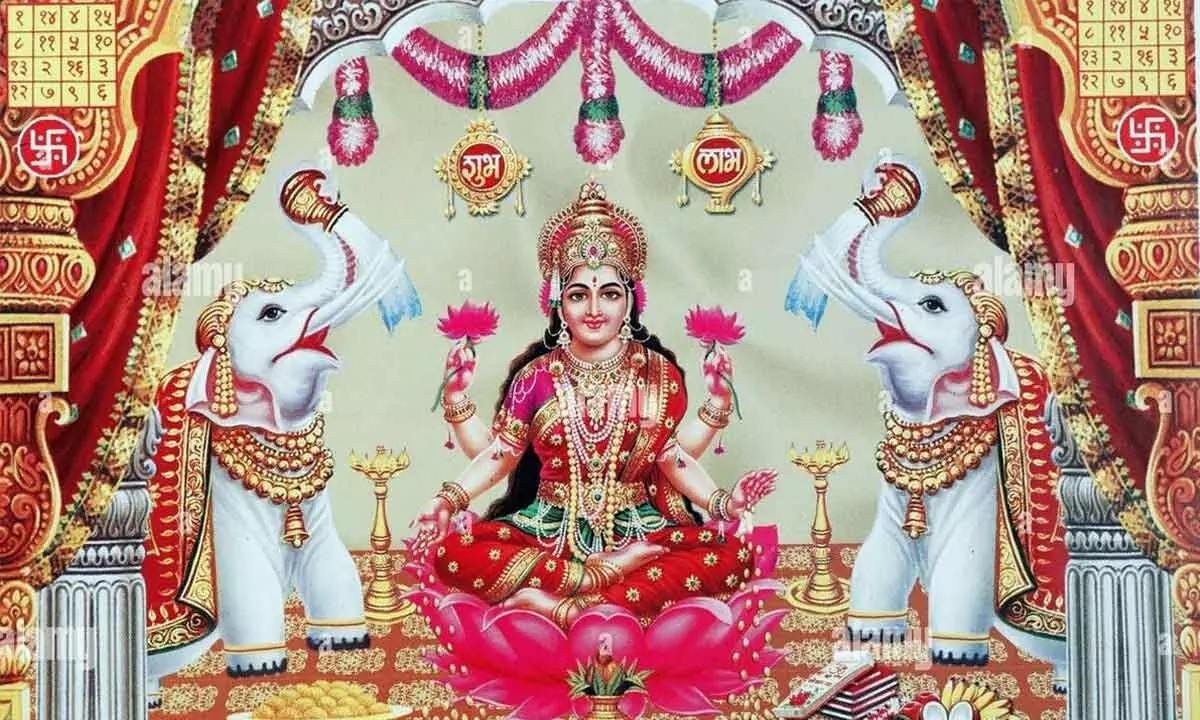Social Consciousness: Lakshmi – The Goddess of Fortune

Shravan is the month in which many Hindu women are in high spirits, worshipping divinity in several forms. One important festival is that of Lakshmi, the goddess of fortune. There are various myths about Lakshmi’s origin, but the myth of churning the milk ocean described in Srimad Bhagavatam (Bk 8, Ch 8) is very popular.
When gods and demons collaborated to get nectar by churning the milk ocean, several precious things came out of it, including poison. Gods and demons ran in fear, but luckily, it was taken by Shiva, who kept it in his throat. Churning the ocean was resumed, and then came the most lovely, graceful goddess, Lakshmi. All eyes were on her. There was delightful music as she walked with jingling anklets, and her well-endowed, slender form enchanted everyone. Indra brought a gem-studded throne to sit on, and other gods brought the best gifts to impress her.
She raised her head with feminine shyness and looked at all the suitors. Someone was great in austerity but had not subdued anger; someone had intellect but not attained detachment; some were eminent but had not controlled (kama) desire; and someone was highly righteous but too harsh in a temper. And so were all, with some defect or the other, except Vishnu, who was faultless, but was absorbed in himself (atmarama). Lakshmi chose him, placed a garland of lotuses around his neck, and kept her on his chest.
This story has a great symbolic meaning. The human mind is the milk ocean with immense potential. You churn it and get what you want. As we saw in earlier articles, Gods and demons are our good and bad tendencies. Poison, all unhealthy ideas, also come out of it. Shiva controlled it. The word Shiva means auspiciousness. Lakshmi, prosperity, is also a product of churning. She stays firmly with someone who is impeccable in character. In the myth, Vishnu is the god who symbolizes the sustenance of the universe, and it follows that all the universe’s resources (Lakshmi) must be with him. In some depictions, we also see her pressing the feet of Vishnu. Symbolically, it says that Lakshmi is like a servant for those who are not her servants.
Lakshmi is not merely gold or bundles of currency. Still, it has many other forms, like intellect, austerity, health, success in life, happy domestic life, children of good character, courage, fame, philanthropic nature, getting an enlightened guru and so on. For the spiritual seekers, the Vedas are Lakshmi, as one Vedic line says. Many times, evil people also acquire wealth, but it does not stay long, or it does not give happiness. We see the stories of asuras, those who indulge in sensual gratification and acquire great wealth, but it degrades them and leads to their downfall. Such ill-gotten wealth is what Christian myths call Mammon. Wealth acquired through dharma alone is stable, which is why the abode of Lakshmi is Vishnu’s bosom.
Lakshmi is the presiding goddess in the story about the killing of the mighty demon Mahisha (literally meaning ‘buffalo’, symbolizing arrogance). Ambika killed him in this story. Mahisha and his assistants had conquered all gods and usurped all the world’s wealth. They symbolize arrogance, haughtiness, and pride, which are the result of wealth. These qualities led to their downfall. That is why the Vedic passages like Sri Suktam pray for Lakshmi, who is accompanied by virtues.
(Writer is former DGP, Andhra Pradesh)








